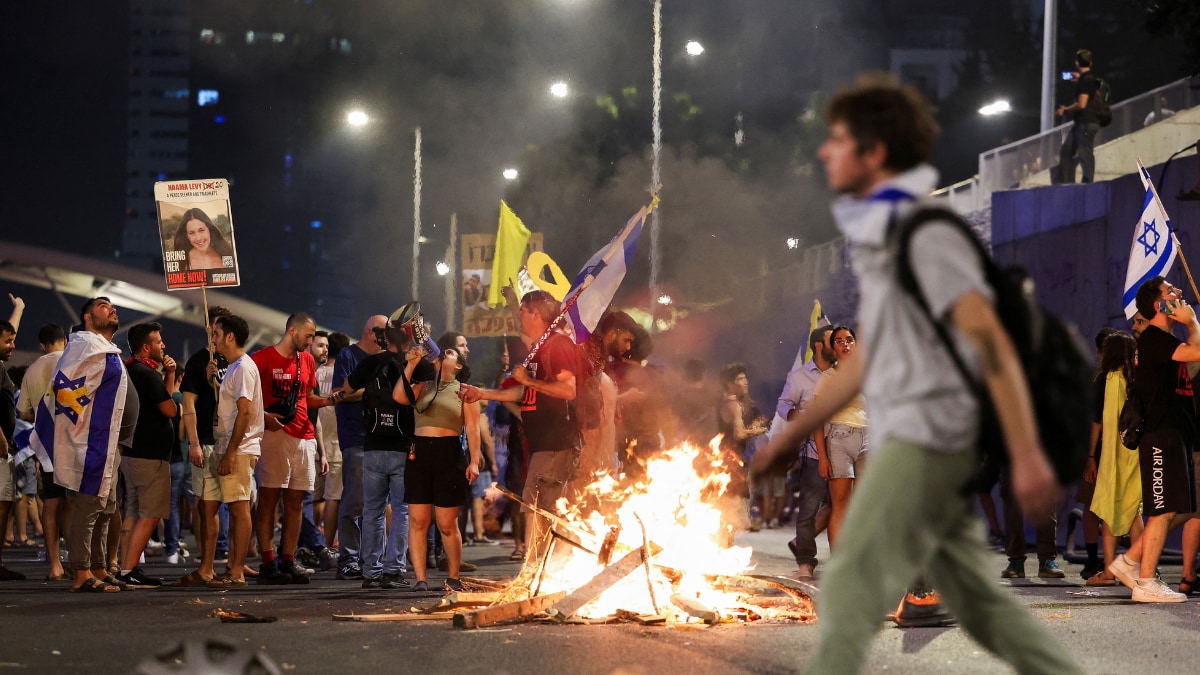Israel has been embroiled in a devastating war with Hamas for nearly 11 months, and the situation is far from resolved. The conflict has resulted in the deaths of thousands of Palestinians and over 1,200 Israelis. The situation is reaching a boiling point as public pressure mounts on Israeli Prime Minister Benjamin Netanyahu to end the war and secure the release of the remaining 101 hostages held by Hamas.
The Mounting Anger in Israel
The public’s anger in Israel is palpable, with hundreds of thousands of protesters taking to the streets across the country, demanding Netanyahu negotiate a ceasefire deal and secure the release of the hostages. The protest in Tel Aviv, one of the largest demonstrations in Israel’s history, highlighted the growing public dissatisfaction with Netanyahu’s leadership and the government’s handling of the war. Protesters blocked major highways, demanding that the government take action to bring an end to the conflict.
The return of the bodies of six slain hostages from Gaza, after months of uncertainty, intensified the public outcry and amplified calls for decisive action. The bodies were identified as those of Carmel Gat, Hersh Goldberg-Polin, Eden Yerushalmi, Alexander Lobanov, Almog Sarusi, and Ori Danino. A forensic examination revealed that they had been “murdered by Hamas terrorists in several shots at close range” in the days leading up to the discovery.
The Demand for Accountability
The families of the victims, while deeply saddened by the loss of their loved ones, expressed outrage at the lack of progress in bringing back the remaining hostages. The family of Carmel Gat, in particular, publicly refused to speak to Netanyahu, instead urging the public to continue protesting until the safe return of all the hostages. They stressed that the hostages, some of whom are children, still have a chance of being rescued.
The death of the hostages also reignited the debate about the government’s handling of the negotiations with Hamas. Netanyahu has faced mounting pressure to secure the release of the remaining hostages, but his efforts have been met with skepticism by the public. Many Israelis believe that Netanyahu is not doing enough to bring an end to the conflict, and they are demanding a swift and decisive response from the government.
The Government’s Response and the Impasse
The government’s response to the escalating pressure has been a mixture of defensive rhetoric and attempts to appease public anger. While Netanyahu promised to “settle the score” with Hamas for the deaths of the hostages, he continues to resist calls for an unconditional ceasefire and the release of Hamas prisoners as part of a hostage exchange deal.
The Israeli government’s refusal to negotiate on a prisoner exchange deal is rooted in a number of factors, including concerns about security implications, the fear of emboldening Hamas, and the perception that it would set a dangerous precedent for future conflicts. The government argues that any deal must be contingent on the complete return of all the hostages.
However, the growing public dissatisfaction and the calls for decisive action from both the opposition and some within the government itself are putting immense pressure on Netanyahu. His stance is being challenged not only by protesters but also by members of his own party, who fear the growing unrest and its impact on the upcoming elections.
The International Pressure
The international community has been actively trying to broker a ceasefire deal, with the US, Qatar, and Egypt acting as mediators. While there have been intermittent pauses in the fighting, these have been short-lived, and a permanent ceasefire agreement remains elusive.
The US, while supporting Israel’s right to defend itself, has also been putting pressure on the government to seek a negotiated solution. The growing death toll and the deteriorating humanitarian situation in Gaza have prompted calls for an immediate ceasefire. The US has warned that the situation in Gaza is “unsustainable” and has urged the Israeli government to take steps to avert a humanitarian crisis.
Despite the international pressure and the internal calls for action, Netanyahu remains adamant that Israel will not concede to Hamas’ demands and that it will continue its military operation until all the hostages are returned.
The Long-Term Implications
The current conflict in Israel is a tragic culmination of decades of tensions and conflict. The cycle of violence, fueled by mistrust, political polarization, and unresolved issues, shows little sign of abating. The long-term implications of the current war are potentially devastating. The destruction in Gaza and the displacement of millions of people could have a lasting impact on the region for years to come.
The stalemate in negotiations, coupled with the growing unrest in Israel, creates an increasingly dangerous situation. The potential for escalation is real, and the lack of a clear path to a negotiated solution is deeply concerning. The international community needs to play a more proactive role in mediating a peaceful solution and preventing a wider conflict.
The Need for Dialogue and a Just Solution
The current conflict highlights the urgent need for dialogue and a just and sustainable solution. A permanent ceasefire, based on mutual understanding and respect, is crucial for achieving long-term peace.
The future of Israel and the Palestinian territories depends on a peaceful resolution of this long-standing conflict. The ongoing violence serves no one. It is time for both sides to engage in meaningful negotiations, backed by a commitment to finding a lasting peace.









